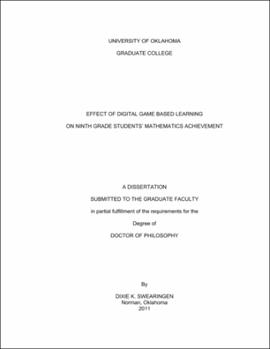| dc.contributor.advisor | Maiden, Jeffrey||Vaughn, Courtney | |
| dc.creator | Swearingen, Dixie Kaye | |
| dc.date.accessioned | 2019-04-27T21:22:46Z | |
| dc.date.available | 2019-04-27T21:22:46Z | |
| dc.date.issued | 2011 | |
| dc.identifier | 99136752002042 | |
| dc.identifier.uri | https://hdl.handle.net/11244/318534 | |
| dc.description.abstract | This experimental study examined the effect of an educational massive multiplayer online game (MMOG) on achievement on a standards-based mathematics exam. It also examined the interaction of student characteristics (gender and socioeconomic status) with digital game play on mathematics achievement. Two hundred eighty ninth grade students from a large rural high school located in the United States Midwest participated in the study. The were randomly assigned to "treatment" or "control" group, whoever played or did not play the interdisciplinary MMOG. A standards-based pretest was administered followed by digital game play on the MMOG. A posttest was given after playing the MMOG for 14 class periods over a seven week period. A sequential regression analysis was conducted on the data. No statistically significant results were found in the mean posttest results between the control and treatment groups. Nor were statistically significant results found between gender groups. However, statistically significant main results were found between socioeconomic groups, and the interaction of group (control and treatment) with low socioeconomic students scoring much lower than non-low socioeconomic students. A sequential regression analysis was also conducted only on the treatment group to determine if statistically significant relationships may be contributed to the amount of time immersed in digital game play and the interaction of digital game play with student characteristics (gender and socioeconomic status). Statistically significant results were indicated i time (minutes of play) and the interaction of time and socioeconomic status. Results implied for every minute a student is engaged in playing an interdisciplinary MMOG, posttest scores may increase .11 points. However, if a student is low socioeconomically, posttet scores may decrease by 11.24 points if engaged in digital game play. These results will enable educators to draw upon the implications for including an interdisciplinary MMOG as in instructional tool and integrating it within the curriculum. | |
| dc.format.extent | 169 pages | |
| dc.format.medium | application.pdf | |
| dc.language | en_US | |
| dc.relation.requires | Adobe Acrobat Reader | |
| dc.subject | Games in mathematics education--Case studies | |
| dc.subject | Simulation games in education--Case studies | |
| dc.subject | Internet games | |
| dc.subject | Mathematics--Study and teaching (Secondary) | |
| dc.title | EFFECT OF DIGITAL GAME BASED LEARNING ON NINTH GRADE STUDENTS' MATHEMATICS ACHIEVEMENT | |
| dc.type | text | |
| dc.type | document | |
| dc.thesis.degree | Ph.D. | |
| ou.group | Jeannine Rainbolt College of Education::Department of Educational Leadership and Policy Studies | |
